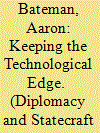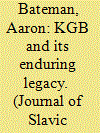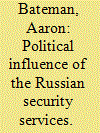| Srl | Item |
| 1 |
ID:
188629


|
|
|
|
|
| Summary/Abstract |
In March 1983, President Ronald Reagan established the Strategic Defence Initiative [SDI], a research effort to develop the technologies for land- and space-based missile defence. This programme quickly unleashed anxieties about an arms race in space. Superpower military space activities were of significant concern to Britain because they had direct bearing on two key areas of its national security: space-based intelligence collection and the credibility of its nuclear deterrent. This analysis argues that the uses of space for military and intelligence purposes was an essential, though often invisible, aspect of the Anglo-American relationship during the Cold War. Despite the opposition of her senior advisors to SDI, British Prime Minister Margaret Thatcher maintained that the programme was necessary to stay ahead of the Soviet Union in an intensifying high-technology competition. Rather than opposing the expanded militarisation of space, she believed it required careful management to further British national security interests.
|
|
|
|
|
|
|
|
|
|
|
|
|
|
|
|
| 2 |
ID:
148386


|
|
|
|
|
| Summary/Abstract |
The creation of the Federal’naia Sluzhba Bezopasnosti in 1995 represented the eighth time that the Russian secret police underwent an organizational transformation since the contemporary service was created in the form of the Cheka in 1917. The post-Soviet Russian security services have been shaped by the early Soviet secret police’s identity as a domestic security service protecting the Bolshevik Party. After the USSR collapsed, the KGB did not die; its power increased to a level not seen since the Andropov era. The FSB is the most direct successor to the KGB’s domestic apparatus and functions as both an intelligence agency and the extrajudicial political police of the Russian Government. The FSB has become the dominant security institution in Russia, which is emblematic of the Russian state’s continuing and historical obsession with domestic security and the use of extrajudicial force to maintain political stability.
|
|
|
|
|
|
|
|
|
|
|
|
|
|
|
|
| 3 |
ID:
186087


|
|
|
|
|
| Summary/Abstract |
In the early 1970s, Moscow and Washington had established a satellite verification regime to monitor arms control treaty compliance. Satellites had become a primary source of transparency and stability in superpower relations. Yet by the end of the 1970s, both the United States and the USSR were developing anti-satellite (ASAT) weapons that could destroy observation satellites. This article uses recently declassified archival documents to show that Jimmy Carter pushed for ASAT limits due to his broader arms control agenda, whereas Ronald Reagan rejected ASAT arms control primarily because of its potential impact on the Strategic Defense Initiative.
|
|
|
|
|
|
|
|
|
|
|
|
|
|
|
|
| 4 |
ID:
133758


|
|
|
|
|
| Publication |
2014.
|
| Summary/Abstract |
The Komitet gosudarstvennoy bezopasnosti (KGB) has been preserved under the new names of the post-Soviet security services, particularly the Federal'naia sluzhba bezopasnosti (FSB). The continuities between the Soviet and post-Soviet security institutions, coupled with the chaos following the collapse of the Soviet Union, have produced a post-Soviet Russia that has strayed away from democracy and developed into a counterintelligence state. Former Soviet security services officers are the ruling elite in modern Russia. The post-Soviet security apparatus is one of the most influential institutions in the formation of Russia's foreign policy, and the domestic security situation in Russia directly affects its foreign policy toward the United States. The post-Soviet security apparatus has significantly influenced Russia's departure from democracy and pursuance of a hostile foreign policy toward the United States.
|
|
|
|
|
|
|
|
|
|
|
|
|
|
|
|
| 5 |
ID:
171060


|
|
|
| 6 |
ID:
193177


|
|
|
|
|
| Summary/Abstract |
During the Cold War, the United States and the Soviet Union implemented multiple arms control treaties that depended on National Technical Means (NTM) for verification. Since NTM included covert satellite reconnaissance systems that gathered a sizeable portion of American intelligence on the USSR, the US government kept the details about its NTM ambiguous. Consequently, US diplomats had to negotiate a verification framework dependant on NTM without compromising sensitive space-based intelligence capabilities. This article uses newly declassified documents to explore how Washington and Moscow navigated the boundaries of secrecy concerning space reconnaissance to create a robust arms control verification regime.
|
|
|
|
|
|
|
|
|
|
|
|
|
|
|
|